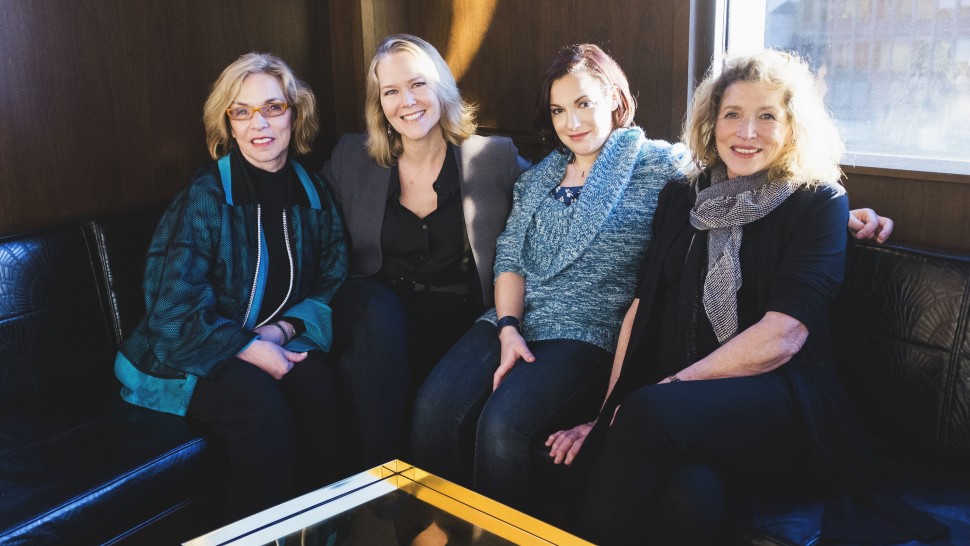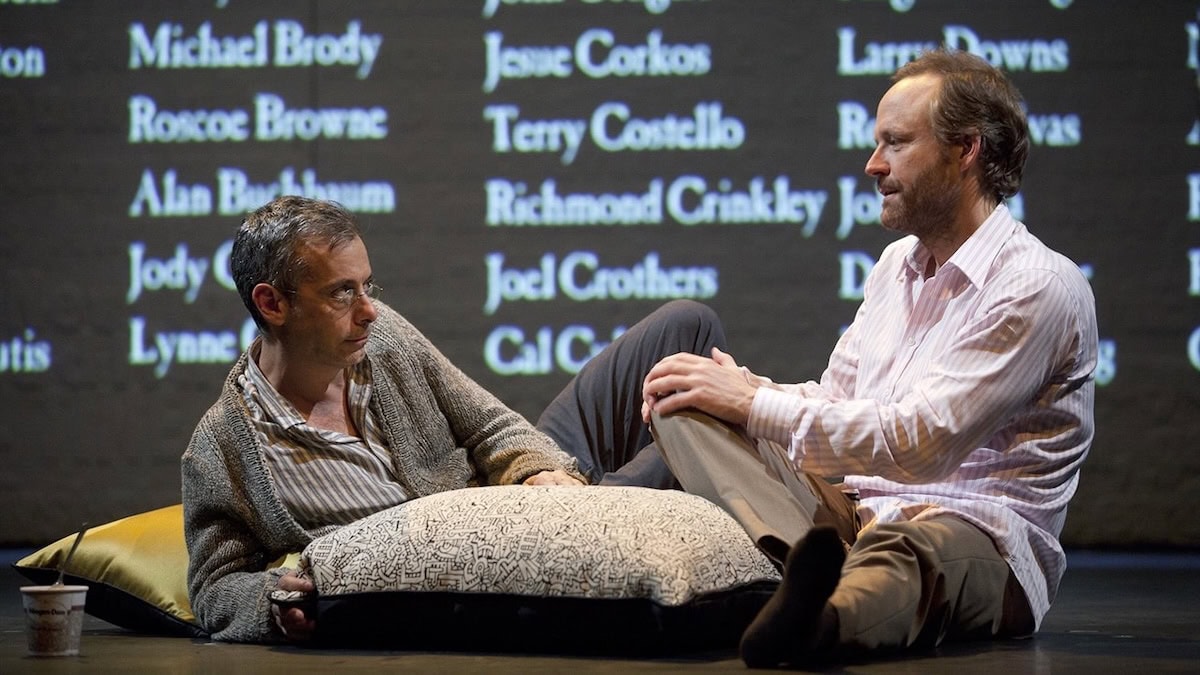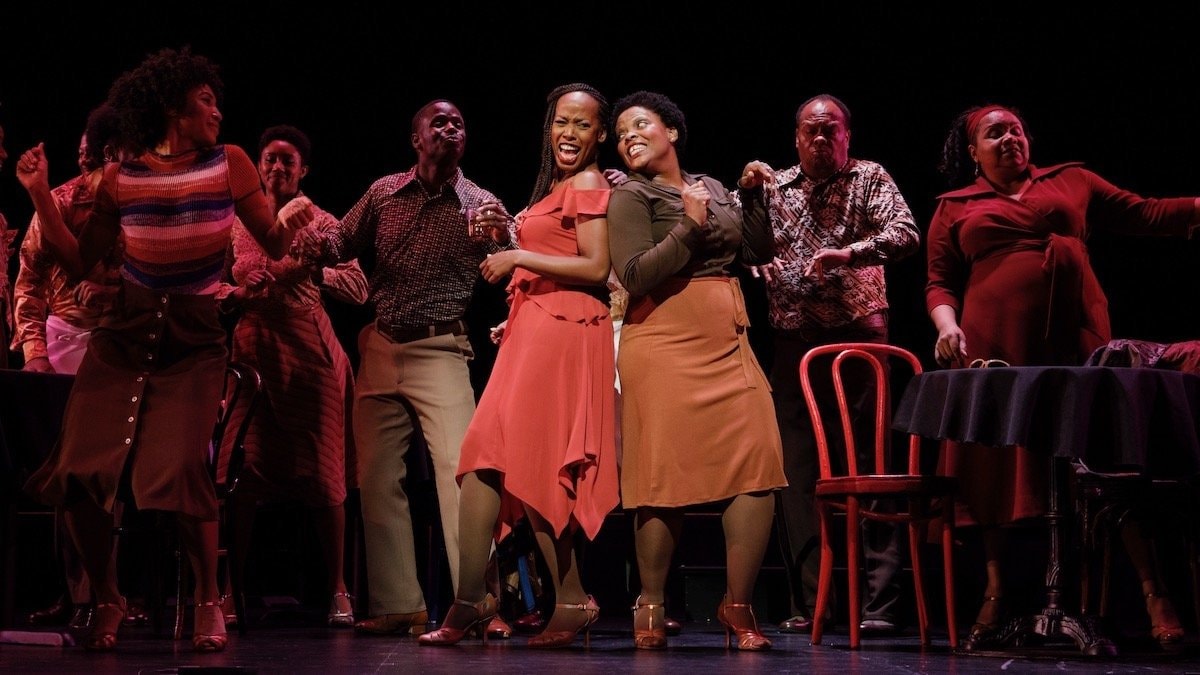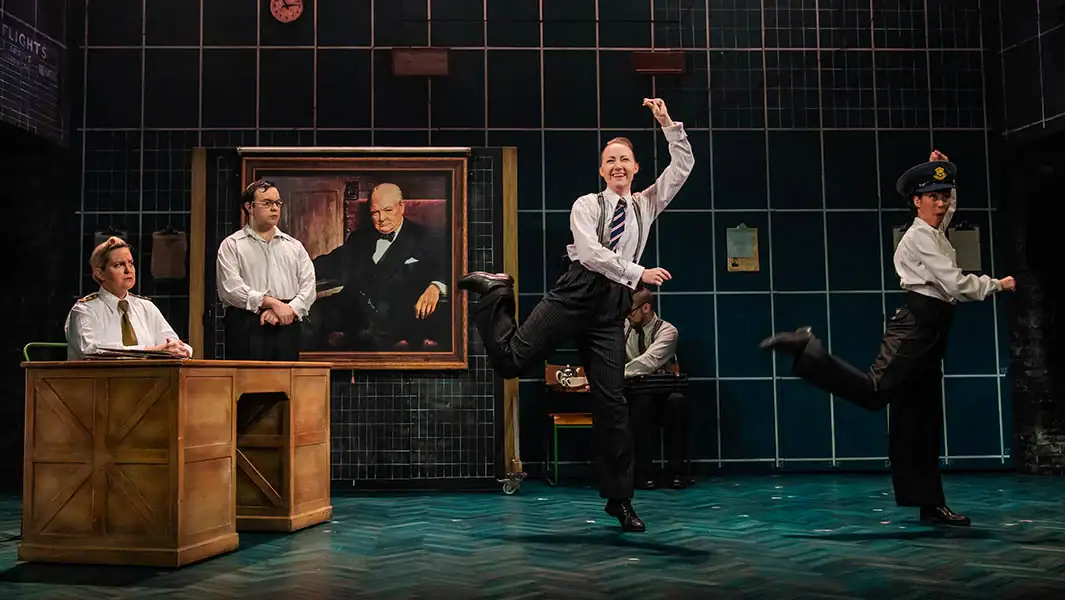
Originally printed on January 7, 2016.
The Secret Garden arrived on Broadway at the St. James Theatre 1991, it was considered a bold curiosity by the press: Four women had taken on the task of bringing Frances Hodgson Burnett’s beloved children’s novel to life as a stage musical — to a reported tune of 6.2 million dollars.
Under the direction of Susan H. Schulman, The Secret Garden featured a score by Simon, with book and lyrics by Norman. The production was produced by Heidi Ettinger, who also designed the set for the show that nestled the action within a child’s Victorian dollhouse. The all-female creative team was a first for Broadway.
Eagan, an 11-year-old actress who had previously appeared on Broadway as Young Cosette in Les Misérables, was tasked with carrying the musical on her shoulders in the role of young orphan Mary Lennox. The role, which kept Eagan on stage for much of the show, was a paradigm shift for what was emotionally required of child actresses in a post- Annie musical theatre sphere. Also stepping into her second Broadway production was Luker as the ethereal Lily, whose death haunts her widowed husband Archibald (played by Mandy Patinkin in the original).
Eagan made history only two months later, becoming the youngest actress to ever win a Tony Award. The Secret Garden picked up additional Tony wins for Norman’s book and Ettinger’s designs. The production was also nominated in the categories of Best Score and Best Musical, Best Featured Actress (Alison Fraser) and Best Costumes ( Theoni V. Aldredge).
Since then, the stage property has become as beloved among theatregoers (and performers) as Burnett’s original novel. Two high profile productions will bloom in New York City this winter.
On Jan. 11 and 17, a benefit staging will take place at the Lucille Lortel Theatre, with Luker reprising her performance as Lily and Eagan hosting. On Feb. 21 and 22, David Geffen Hall will host another starry production with Eagan cast in the role of determined housemaid Martha. (She was literally cast during this interview.)
In anticipation of these concerts, we reunited Eagan, Luker, Norman and Simon, who reflect on their groundbreaking work with The Secret Garden.
When The Secret Garden premiered in 1991 there was a lot of buzz in the press that a new musical was arriving on Broadway with four women steering the ship.
Lucy Simon: I think it was the first, was it not?
Rebecca Luker: Jesus, really?
That thread continued with musicals like Fun Home and now with Waitress coming to Broadway this year. Do you feel a connection to the women who are creating these shows?
Marsha Norman: Well, it was a great pleasure when Lisa Kron and Jeanine Tesori saluted us when they got their Tony this year. They said, “You know, Marsha and Lucy were here before us and we’re glad that they kept the door open just wide enough,” so that they could get through. So, yes is the answer. Yes. I feel an enormous pride…
LS: Having opened the door —
MN: To this bizarre idea that women all by themselves could make a show. What a crazy idea!?
How did this project come about initially?
MN: The Secret Garden wouldn’t have happened without Heidi Ettinger. Heidi is the one who had the idea initially. She contacted me initially. She was the one who got the Dodgers behind her and the Jujamcyns [the producers] with her.
LS: I always loved “The Secret Garden” as a book. I’d read it to my daughter, and it was very wonderful. Then Heidi and Marsha were looking for a composer, and so I did something on spec. I wrote a song. Marsha had already written a first-draft book and some lyrics. The first lyric that I said, “I’m gonna try that” was “I Heard Someone Crying,” and so I did that as my demo. Then the word got back to me from Marsha and Heidi that that’s the sound they were looking for.
Marsha, this was your first Broadway production since winning the Pulitzer for ‘night Mother and your first musical. It’s an interesting artistic leap. How did your involvement come about?
MN: It was my first musical. I had been pounding on doors for years trying to get people to let me write a musical. I grew up at the piano; I played my way through school on a music scholarship. I don’t have a desire to write music, but that musical bug is in me. Heidi called me, said she knew that I had been wanting to write a musical, and she called one day and said, “What about, ‘Secret Garden,’ and I was like, ‘What’s that?'” I might be the only person who had never read the book because I had grown up in a house where that wasn’t the reading material that was available.
RL: Were you a Mennonite?
MN: Kind of an Evangelical Christian… You know, Daniel in the lions’ den again and again. I just didn’t know [“The Secret Garden”]. In a way I think it was useful that [Lucy] loved it and I didn’t know it at all, so that we had a way of working on it from both the innocence of an audience and the audience who had known it for a long time.
LS: There’s something very interesting that I reflect on years later is: I was able to find Marsha’s voice in music. I translated her lyrics in a way that felt so organic, and Marsha is an incredible lyricist. She’s an emotional lyricist. It’s just something that came out of you, and it was very exciting to write with her.
RL: Marsha, you said you wanted to write musicals. Did you think, at first, that you wanted to just write the book of the musical, or did you always have lyrics in mind as well?
MN: You know, Rebecca, I didn’t [have lyrics in mind]. I feel like I was taught by the great lyricists that went before me. I think it’s the hardest single part of doing the creation is the lyrics, because they’re just so easily stupid. They are so easily ponderous and incomprehensible. I think that Lucy as a singer is really able to take a lyric and put a singable line under it…like the dreaded “Fine White Horse,” they were written words first. You can tell. They have a lot of just exposition in them.
LS: Or how about “How Could I Ever Know?”
DE: Oh, God. I still don’t think I can listen to that.
LS: Here’s the story of —
MN: Why don’t I tell it? Lucy always tells it the best — I love how you tell it…it’s just not right. [Laughter.] When we were working on the show, I was coming into town to work on the show, and then I was driving back down to Quogue [NY] where we lived. The kids were out there, and so it was this constant motherhood and artist on the highway. It was just an impossible time. And so, one night, driving out there I thought, “Aw crap, what would happen to me? What would happen to them if something happened to me on this road?” And then, anxiety ridden, I thought, “Okay, I need to write them something that takes care of that.” By the time I got home [I wrote], “How Could I Know I’d Have to Leave You/How Could I Hurt You So/You Were the One I Was Born to Love/Oh, How Could I Ev
er Know.” That was sort of made to my children… Then I worked more, and I called Lucy and then she cried. I remember standing outside on the phone sobbing about this song, about how that is what you feel.
At the time of its Broadway premiere, many in the press characterized The Secret Garden as a multimillion dollar musical for kids, but in many ways, the kid-friendly title feels like an entry point for some very adult themes. Mary’s world and that of the other characters are centered around loss. Certainly the relationships between mother and child are key. Daisy, having lost your mother shortly after The Secret Garden and now being a mother, have those themes reflected in your life in new ways since then?
Daisy Eagan: It’s funny. I was listening to the Sirius Broadway channel the other day and “Hold On” came on. I wound up weeping… just completely weeping. It was the first time it had that effect on me. I suddenly realized — I mean I’ve known this, but it really sunk in — that while I was doing the show my mother was dying and how lucky I was that, first of all, that I had the show at all, but that I got to, every night, have those words said to me. I feel like, having done that show, I really do — and this is not hyperbole — I really do feel like it saved my life. I don’t know how I would have survived without the resources that the show gave me personally and the community that it gave me.
LS: You sure had a lot of mothers there.
DE: I sure did. I really, really did. I was very lucky.
MN: We thought we were the lucky ones, can I just say? You, you were a new performer. You were a new kind of girl, you know? You were not like somebody from Annie, not that that’s a bad show. It’s just that you were a girl with thoughts and demands.
DE: I was very lucky that I had the mother that I had, you know, the parents that I had because they raised me to be that kind of person.
LS: I just remember the incredible audition that Daisy did, and one of the things I think that everybody feels about this show is that it’s healing. There’s so much love in the show and it just makes people recover. When Daisy came in, you were just a little thing, and you were carrying a basket and in the basket was an egg. Was it part of a science assignment?
DE: It actually, no, I just took it on myself.
LS: You did?
RL: Was it a prop?
DE: No, I just thought, “I’m going to carry this egg baby around.”
LS: And she came in with this basket, and she put it on the audition table, and she said, “Will you watch over this for me while I sing?”
RL: Oh my god.
DE: It never occurred to me. It wasn’t…
MN: Like how manipulative it was?
[Laughter.]DE: Yes!
LS: I want to say something about Rebecca when she came in for an audition.
MN: The role of Lily, I felt so connected to. It’s just my being a mother. When Rebecca sang this, I just thought, “Oh, I’m so happy to give this role to Rebecca because she just seems like her soul, her voice just feels so right.” So the casting was very important to us in the creation of the show and passing it on to the people who brought it to life.
RL: It was a gift for all of us. [For the audition] I just did my own interpretation of it, but I did get to “How Could I Know” in the audition and couldn’t finish the song. I remember just apologizing and then going, “I can’t. It’s so beautiful that I just can’t finish the song.”
You said earlier that Daisy had a lot of mothers on that show. There are so many strong female actresses and characters who drive the course of the action. What was the atmosphere like backstage?
DE: I was so young that my experience of it is so different, you know. Sometimes people are like, “Oooh, tell me gossip about this,” and I’m like, “I don’t have it.” For me, it was just like all of these people that loved each other and were supportive.
RL: It was like that. We were a very close company. I remember because I had a very, kind of a lonely show, but I’d get dressed really fast, and then I’d stand in the wings and sing along with the ensemble because I love the score so much. I was literally in the wings every night: “High in the hills/[There’s a big old]…” I just couldn’t get enough of it.
The pressure and intensity of the Broadway awards season, especially when Tony nominations roll out, is huge. Daisy, were you affected by it at all?
DE: I was fairly protected. I didn’t really know a lot about it, because I didn’t come from a theatre background. I don’t think I’d ever watched the Tony Awards before. I guess I had some hint of it because the Drama Desk and the Outer Critics had already happened, but I was certainly shocked when I found out that I was nominated, and my mother was very keen to remind me that they don’t give Tony Awards to children. She really didn’t want me to get my hopes up. Plus, that was just sort of her mothering. Thank God we wrote those names on that card because I would have gone totally blank.
For Lucy and Marsha, what was your experience like putting this show out into the world, especially Broadway?
LS: I don’t know if you know, but the main reviewers in New York were very unkind to us.
MN: I think sometimes critics get angry that you’ve made them feel something.
LS: The first review that I read of The Secret Garden was Clive Barnes, who said, “I might have liked this musical if I had a mute button.”
DE: Whoa!
RL: That’s unbelievable. It’s easily one of the best scores.
DE: Can I ask a question? Why has it not been revived?
LS: I think it will be.
MN: We’re waiting for the right moment and the right people, you know? It’s a big combination.
DE: I know a really good Martha. [Laughter.]RL: You would be a good Martha!
MN: Well, there you go. Please come to the Geffen and sing. Has Martha been cast for the Geffen?
DE: We’ve put my name in.
MN: Just consider it done. You’ll just be the only one we’ll look for.
LS: I’m gonna send an e-mail right this moment. My bag… Can you? [Simon reaches to pull her cell phone out of her purse to email the casting team.]DE: This is how deals get made!
LS: I also want to go back to that whole thing about women making theatre. I think that is a really, really important point. That these days what you hear is, “We need more women, we need more minorities,” … so now it’s significantly easier 25 years on for a female team to come forward with something, but back then that was real trailblazing.
MN: We began to feel at the time, though, that it was distracting people from the show itself. That it’s this, “Oh it’s odd. These girls.” However, we believed that we were opening the door, and that all the other musicals written by women would come storming in — but no. Not until this year, with Lisa and Jeanine [the Fun Home writing team]. It is a struggle that requires to be won again and again. I’m happy that we’re talking about it, but I’m sorry that we haven’t just been floo
ded by women.
LS: I may be wrong, I may just be a little paranoid, but it seems to me women have made a lot of progress in everything but composers. It’s much harder for composers.
DE: I wonder if it’s the thing of, like, “Well, we’ve got a female book writer, we’re gonna have to get a male,” you know.
RL: Maybe it’s partially the marketing thing the producers are worried about. I don’t know.
MN: I think, Lucy, there are very few people who can write the range of work that you can write.
LS: Are there more men than women that can do that?
MN: I wish that more women composers presented more work of great variety.
Lucy, do you feel that is part of the legacy you imparted to Broadway with The Secret Garden?
LS: It is, for me, such a gift to be able to write it and put it on into the world, and I think that people have received it as a gift. The thing that has given me a great deal of pleasure for many years are people in the theatre that say, “The reason I’m in the theatre is because of The Secret Garden.” And that is a great, a great joy for me because they discovered something about themselves that they could relate to being in musical theatre that they didn’t have before.
RL: Yes, it happens all the time to me, too. People come up and they say, “You’re the reason I’m in musical theatre. I listened to you my whole childhood.” It is so many people’s favorite musical, favorite album. And I’m just proud, like Lucy, to be a part of the original company. To the day I die, it will be one of the greatest gifts.
DE: It’s one of the defining moments of my life. And you know, since I’ve had my son, I’ve felt like everything in my life had to happen precisely, exactly, to the tiniest detail, how it happened for me to have him, and, you know, Secret Garden has shaped a huge part of my life.
This story originally appeared on Playbill.com and is reprinted by permission. Photo: Daisy Eagan and Marsha Norman Credit: Monica Simoes.
To purchase a copy of The Secret Garden, click here, and to learn more about licensing a production, click here.

The Truth Behind… The Normal Heart

Musical Revues

